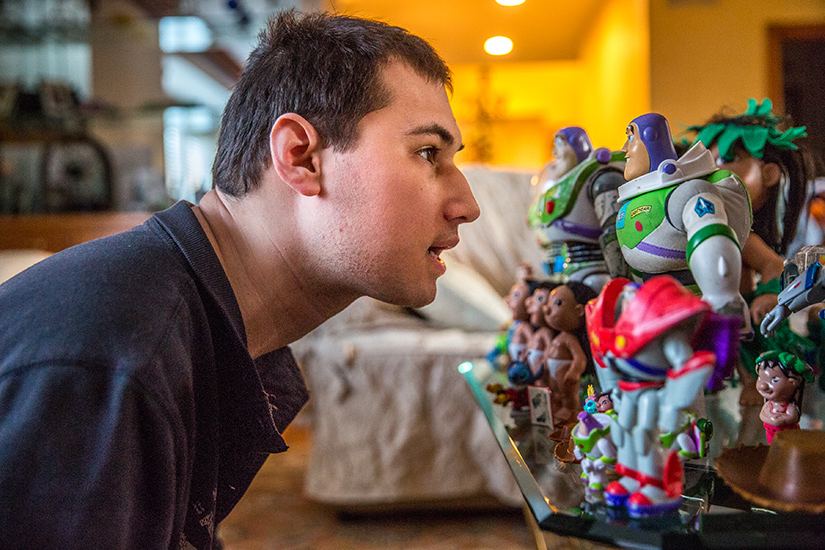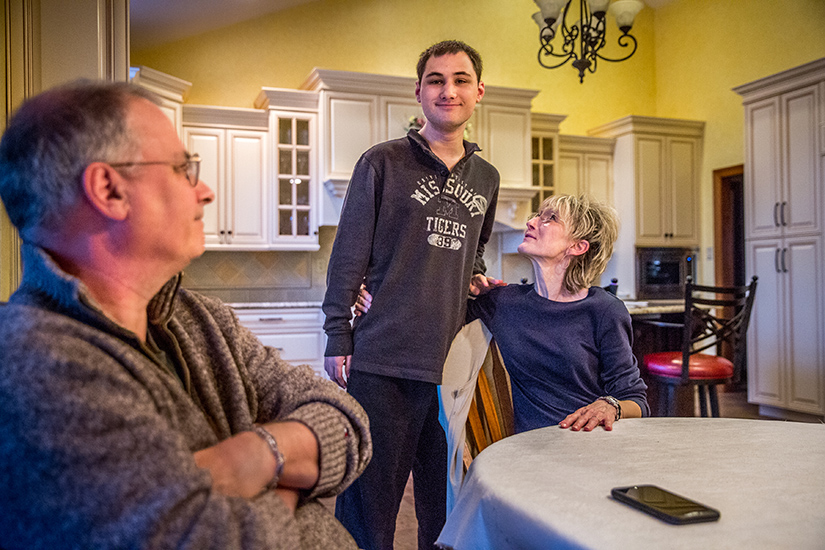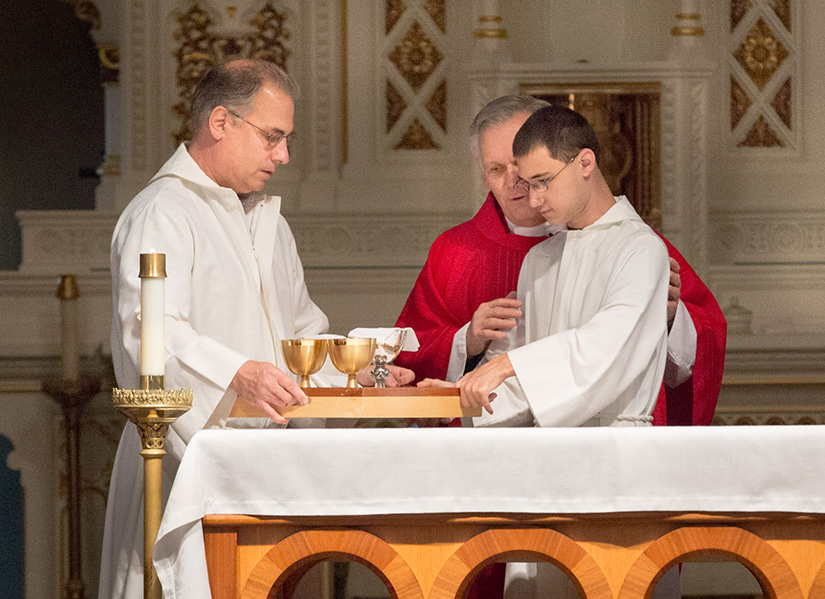John Houston carefully lined up his action figures in neat rows on a coffee table. The largest Buzz Lightyear figures were placed in the back, the medium-sized ones in the middle, and the smallest in the front. He added to the lineup a handful of Lilo and Stitch toys in the same fashion.
When the conversation switched to church, John broke from the routine of lining up his toys to explain why he likes serving at Mass on Saturday mornings.
“God tells all of the people that I am a good server. That’s when God blesses me,” he said. “He knows that I am a pretty good gentleman.”
Steve and Kathy Houston knew early on that something was different about John’s development. The milestones of infancy — crawling, standing and walking — took longer than the average child.
“After he turned about a year old, we were told that he had ‘pervasive developmental delays,’” Steve Houston explained. “I wasn’t sure what that term meant, but after he turned two years old it crystallized into a diagnosis of autism.” About 20 years later, genetic testing revealed John has Renpenning Syndrome – a genetic disorder that is a contributor to autism.
 John Houston played with his favorite action figures, including Buzz Lightyear and Lilo and Stitch, as he set them up in groups on April 4. Houston, who has autism, serves Mass occasionally and enjoys attending Mass at Sacred Heart Church in Valley Park.Photo Credits: Lisa Johnston
John Houston played with his favorite action figures, including Buzz Lightyear and Lilo and Stitch, as he set them up in groups on April 4. Houston, who has autism, serves Mass occasionally and enjoys attending Mass at Sacred Heart Church in Valley Park.Photo Credits: Lisa JohnstonAs the Houstons sought therapy for John to address his developmental needs, his parents also understood the need for spiritual development. The Houstons moved to Sacred Heart Parish in Valley Park when John was 6 years old, and the family made it a point to sit in the front row.
“I was hyper sensitive about John’s behaviors and didn’t want him to disturb others in front of us,” Steve Houston said. “But one of the unintended consequences was there was nothing to obstruct John’s view of the entire altar and all of the reverence associated with it. He could see it in all of the people who come to Communion. He soaked it up like a sponge, and I think he came to understand the reverence there and that really helped.”
Now as a 23-year-old, John Houston occasionally serves at Saturday morning Masses with his dad and frequently gives out hugs to fellow parishioners at Mass. He received his faith formation, including sacramental preparation, from PSR teacher Clare Evertowski. She carefully crafted methods of teaching to help him relate to the lessons. A diagram with happy and sad faces was used in preparing him on how to make a confession, for example.
“People would ask, does he really need to go to PSR?” Steve Houston said. “Well, yeah he should, because we were raised Catholic and he should be included in that. Maybe this might help him be part of the faith community and connect with the parish.”
And as it turns out, members of Sacred Heart have certainly connected with John. Parishioner Steve Kansteiner recalled a moment earlier this year when John stepped out of his pew at church to hug members of the RCIA program who were at Mass to be elected for baptism.
“He follows his heart, shines the light of Christ, and does not hesitate or grieve the Spirit due to social norms or pressures,” he wrote in a Facebook message. “If only we were all so bold and pure, the world would be very different.”
 John Houston, center, talked with his parents, Kathy and Steve Houston. John has autism, and the family says that their parish, Sacred Heart in Valley Park, has become a welcoming place for children with disabilities.Photo Credits: Lisa Johnston
John Houston, center, talked with his parents, Kathy and Steve Houston. John has autism, and the family says that their parish, Sacred Heart in Valley Park, has become a welcoming place for children with disabilities.Photo Credits: Lisa JohnstonSacred Heart is one of numerous parishes in the archdiocese that organizes an annual Mass for families with special needs. But beyond that, parishioners of Sacred Heart have taken a special interest in being a welcoming place for people who have different abilities, said former pastor Father Denny Schaab.
Father Schaab recalled the initial challenge of connecting with John when he met the family years ago. There wasn’t much conversation or eye contact. As the priest developed a relationship with the family, there was a breakthrough, and Father Schaab became a “church father” to John.
“Before every Mass he had to find me,” he said. “He would stand in my face and put his finger on my chest and say, ‘Father, you have to tell the people God loves them and God loves me, too. I’m John.’ Every Sunday, it was the same thing.”
Father Schaab said the Houstons would claim that the parish community has had a positive influence on their son, but the priest noted he’s witnessed quite the opposite, with John having an effect on the people of Sacred Heart. “At Sacred Heart, they have really accepted the special needs kids, and accommodated them very well, especially through our PSR,” Father Schaab said. “It’s a mindset of a lot of people. It’s about listening to the parents and trying to help them as best we can. And when the parish realizes that special needs kids are such a joy … there does get to be a special place in people’s hearts.”
Understanding autism
About the time Houstons received John’s autism diagnosis, the Centers for Disease Control (CDC) reported in 2000 that the prevalence of autism was one out of 150 children in the United States. The prevalence rate has increased in the past decade and a half to one in 59 children, an increase of 157 percent. The CDC describes autism as the fastest-growing developmental disability.
Dr. Jenny Heithaus, a developmental pediatrician with the Knights of Columbus Developmental Center at SSM Health Cardinal Glennon Children’s Hospital, said the shift is in part due to earlier diagnosis of autism in children, as well as an expanded understanding of its characteristics.
 John Houston served Mass in 2014 at Sacred Heart Church in Valley Park. His father, Steve Houston, assisted John in serving the Mass with celebrant Father Denny Schaab.Photo Credits: Lisa Johnston
John Houston served Mass in 2014 at Sacred Heart Church in Valley Park. His father, Steve Houston, assisted John in serving the Mass with celebrant Father Denny Schaab.Photo Credits: Lisa JohnstonThe CDC describes autism spectrum disorder as a developmental disability that is caused by differences in how the brain functions. People with autism may communicate, interact, behave and learn in different ways.
Heithaus noted that autism is primarily a genetic issue. “We think it’s really present from the beginning, before someone is even born,” she said. “We look at the brain and how cells move and connect with each other. We don’t know much more than that — but we know the wiring is different.” While the environment is not a direct cause of the developmental disorder, she said, “we know the environment influences our behavior in general.”
Church communities have a special role in providing support to individuals with autism,” Heithaus said. While there is not a one-size-fits-all approach to supporting people with special needs, “parishes really need to be receptive to families and willing to spend time with them, getting to know a family,” she said. “And as a parent (of a child with special needs), you know your child best — you can offer a lot by saying these are the issues you deal with.”
Steve and Kathy Houston have shared more about their lives with fellow parishioners, especially through participation in several ACTS retreats at Sacred Heart. On a retreat several years ago, Steve Houston shared what it was like when their son was diagnosed with autism. He spoke about the importance of reveling in the life that God creates, and how others can learn from people with autism.
“He’s made me appreciate the ability that I have to connect with another human being,” Steve Houston said. “John doesn’t really have that.” But there are other gifts that he has to share, including an intense love of God and church.
“John has no barriers to belief,” Houston said. “My faith has gone on at a glacial pace, while John is more like a freight train at full throttle. He will talk about Jesus and God — here is a kid who struggles to connect socially and yet he has no problem connecting with his faith. And he does so on such a simple level, but who says connecting with God needs to be extraordinarily complex?”
“The autism spectrum doesn’t always manifest itself visually in the pews until you notice a social impairment,” Houston said. “Sacred Heart created an accepting environment, encouraging us to share our story. People have gotten to know John and now they understand him. He’s part of the great tapestry of parishioners you meet here.”
Autism Resources
Knights of Columbus Developmental Center at SSM Health Cardinal Glennon Children’s Hospital
Mercy Kids Autism Center
Autism Speaks
Easterseals Midwest Autism Service
Missouri Families for Effective Autism Treatment (MOFEAT)
Missouri Department of Mental Health Office of Autism Services
Judevine Center for Autism
St. Louis Arc
AUTISM IN THE FAITH COMMUNITY
Autism Speaks provides resources for families and faith leaders to help families to help people with autism feel welcome in their church community and become active participants. Resources include pew cards, tips to organize a special-needs religious service, guidelines for clergy and religious educators for conversations with parents, and social stories on going to church. Visit www.autismspeaks.org/religion.
Introduce yourself to a family in your parish that has been touched by autism. Autism can create social isolation for the family; networking with others can build stronger communities and enrich one’s faith.
Some individuals may be unable to attend the entire Mass. They may need extra space in the pew or a break. Their parents may bring books or Mass kits for them.
Every person is a gift from God, has a human and universal need of spiritual connection to our Creator and His Son, Jesus Christ. Even people who are non-verbal can acknowledge this connection through gesture or respectful temperament.
We are all made in the image and likeness of God and, therefore, have inherent value and worth. The limitations of what we might be able to do are extrinsic to the measurement of our inherent human dignity.
Every human being is a person first, not a diagnosis; so we strive to use people-first language in all of our conversations.
Families interested in considering a Catholic school for their child with autism may call the Office of Catholic Education and Formation at (314) 792-7320
ADVICE FOR PARENTS
• Contact your priest and and introduce your child. Don’t assume he knows everything about autism. Be willing to offer information and communicate any accommodations that could help your child.
• Consider sharing your family’s story in appropriate situations, such as a CRHP or ACTS retreat setting, or other parish ministry.
• Don’t give up hope if your child is having difficulties at church. The fact you brought your child to Mass is great — they spent time in the presence of Jesus!
• Seek out other families with children who have special needs. Consider forming a parish ministry that provides support to one another and raises awareness of people with different abilities.
Autism diagnosis
Autism is a complex behavioral diagnosis that has two main criteria: difficulty with social communication and repetitive and restrictive behaviors and interests, according to Dr. Jenny Heithaus, a developmental pediatrician with the Knights of Columbus Developmental Center at SSM Health Cardinal Glennon Children’s Hospital.
“Social communication is all the skills we use to relate to other people,” she said. “It starts with social awareness: who is around us. How do we respond to them. Through our bodies, voice and eye contact together.”
Repetitive behaviors are present because of a person’s need for routine and organization, she noted. “Sometimes that comes out in body posture — hand flapping, toe walking, hand posturing.” Other characteristics may include the use of scripted language or restricted interests that permeate many, if not most, aspects of their lives. Other people with autism have difficulties with transitions or excessive tantrums. Some people with autism also have difficulty with processing things within their environment, such as sounds and lights.
The Knights of Columbus Developmental Center provides diagnosis and medical management for children with autism. The center also provides some therapy services, including a social skills program for teens, an early intervention program for children under three and speech therapy. The majority of patients are within a 150-200 mile radius. Once a child receives a diagnosis, the center connects them with resources within the community.
Recognizing the subtleties of the characteristics of autism often leads to earlier intervention, which helps children with behaviors and how they process the environment.
“We see a wide range of impairments in different areas, and every child is truly different,” Heithaus said. “This is considered a lifelong diagnosis, and some individuals respond amazing to therapy. But not everybody has the same response.”
CDC data on autism
Autism spectrum disorder is a developmental disability caused by differences in how the brain functions. People with autism may communicate, interact, behave and learn in different ways. Signs of autism begin during early childhood and usually last throughout a person’s life.
In April 2018, the Centers for Disease Control and Prevention (CDC) released new data on the prevalence of autism in the United States. The study identified one in 59 8-year-old children as having autism. The number is higher than an estimate released in 2016, which indicated a diagnosis of one in 68 children. Data was taken from 300,000 8-year-old children in 11 communities (including Missouri) as part of the CDC’s Autism and Developmental Disabilities Monitoring Network. The program is the largest population-based program to monitor autism and the only autism tracking system that examines health and education records.
To learn more about the CDC’s autism tracking activities, visit www.cdc.gov/Autism. The CDC also has a program with resources for parents, child-care providers and health-care professionals for monitoring children’s development. For more information, see www.cdc.gov/ActEarly.